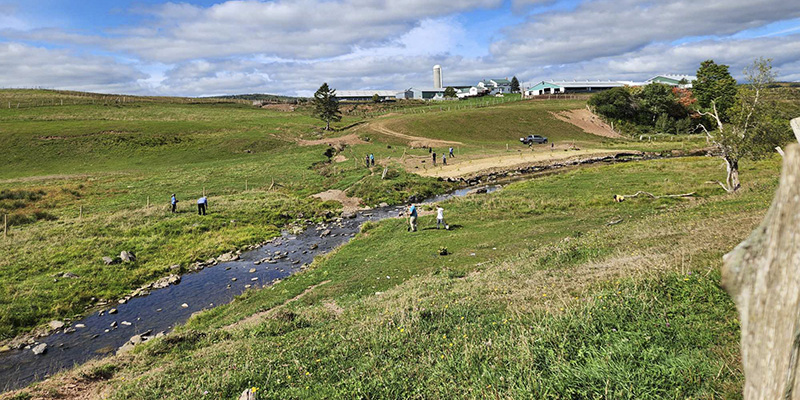Featured Projects
Kennebecasis Watershed Restoration Committee / New Brunswick / 2024
Agricultural Partnerships for Sustainable Watersheds

In the 1990s, a study found that degraded riparian zones and elevated stream temperatures were key limiting factors in the health of the Kennebecasis River and many of its tributaries. Since that time, the Kennebecasis Watershed Restoration Committee (KWRC) have raised funds to support restoration of riparian zones and stream banks. However, with a significant population of farmers along the watershed, it is important to include them in the process, says KWRC Project Manager Ben Whalen.
“Sussex is known locally as the dairy center of the Maritimes, and that just goes to show that there’s a lot of agriculture around within our watershed,” said Whalen. “And farmers have been some of the best supporters of the work that we’re doing. They’ve identified some of their own issues – like eroding stream banks – and we work collectively with the farmers to improve both aquatic habitat and riparian habitat conditions along the river.”
With that in mind, in 2024 KWRC enacted the first step of a multi-year project that will benefit both the farmers and the watershed itself, called Agricultural Partnerships for a Sustainable Watershed. Partnering with WWF-Canada, Nature NB, the Agricultural Alliance of New Brunswick, NB Invasive Species Council and the Canadian Rivers Institute, the KWRC and FCAS will deliver a project that combines both education and action on topics such as biodiversity, invasive species, erosion control and riparian setbacks.
The KWRC will provide farmers near the watershed with educational materials and events which focus on farm monitoring tools and habitat restoration. Farms such as Bettle Point Angus, Walkerville Farms and the Raulston property, among others, will be engaged in one-on-one site planning which will provide resources and tools to help improve riparian health while also demonstrating on-farm advantages.
The project will also see the KWRC improve more than 2500m of fish bearing streams – including stabilizing three eroding stream banks with bioengineering approaches – planting more than 5000 trees and shrubs, and assessing more than 14,000m of cold-water refuge habitat on McLeod Brook to identify threats and passage barriers. The work will be carried out by a combination of staff, students and volunteers. To support the first year of this effort, the KWRC received $17,500 from the Foundation for Conservation of Atlantic Salmon.
“Creating solid working relationships with farmers is crucial to the long-term health of our watershed and our fish populations,” said Whalen. “Farmers are struggling to keep up with on-farm changes that are occurring due to climate change and our staff can assist in identifying vulnerable areas, invasive species and identify opportunities for further farm collaboration, funding and information sharing.”
